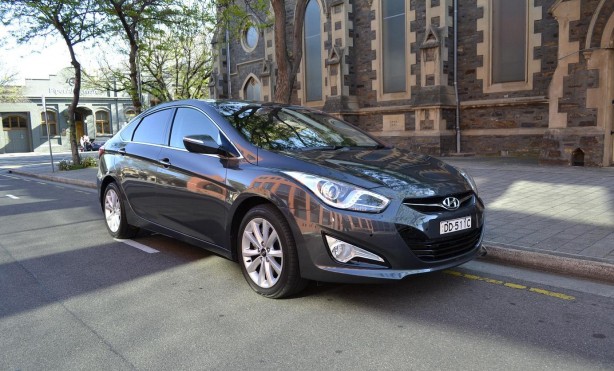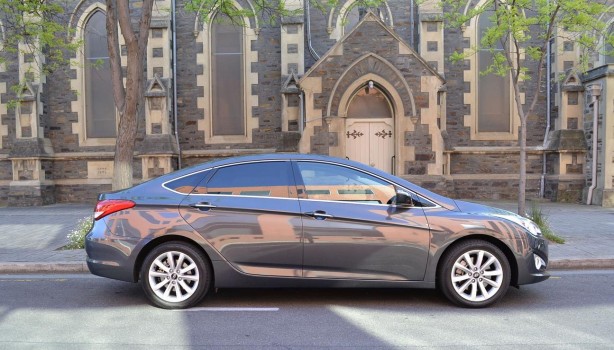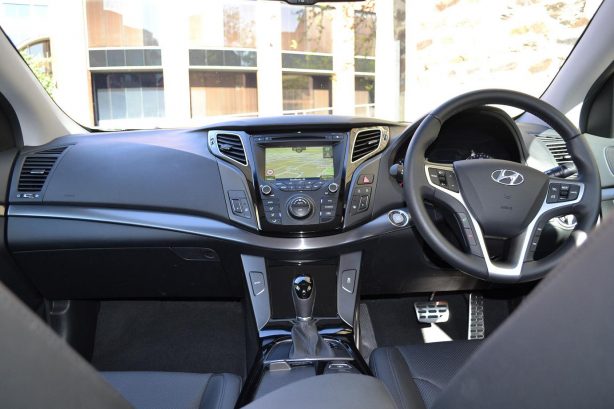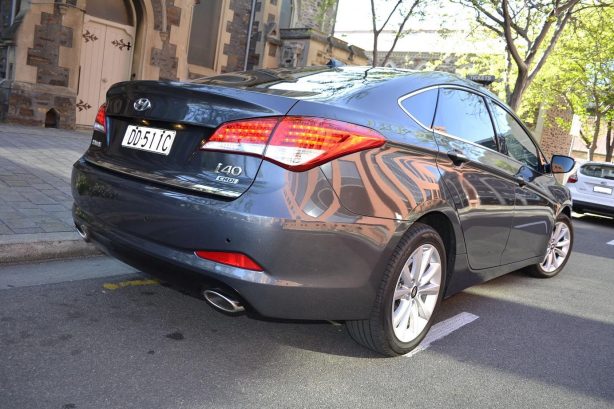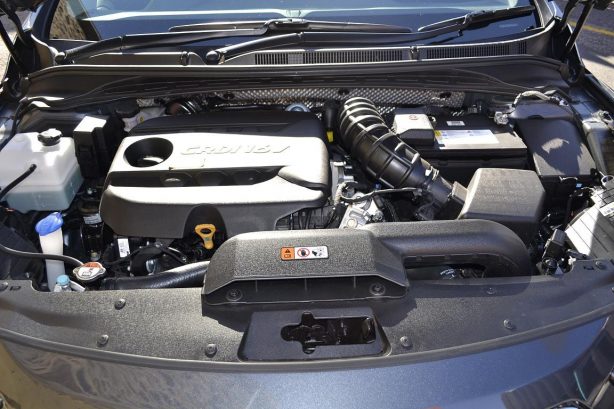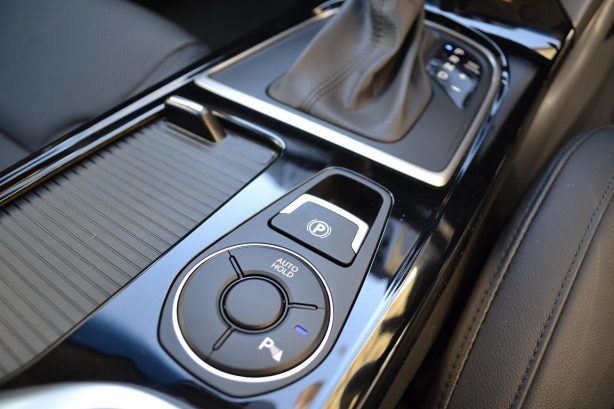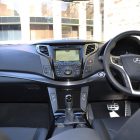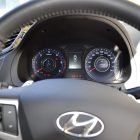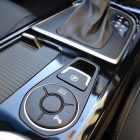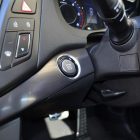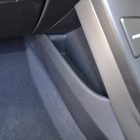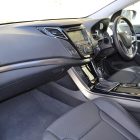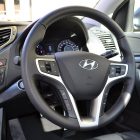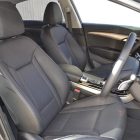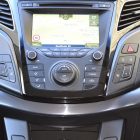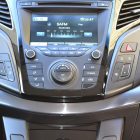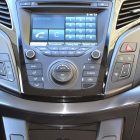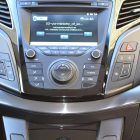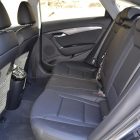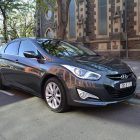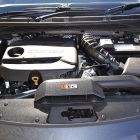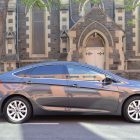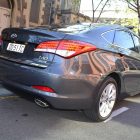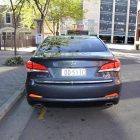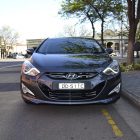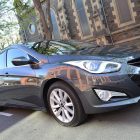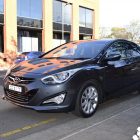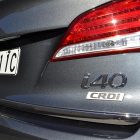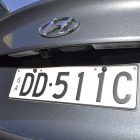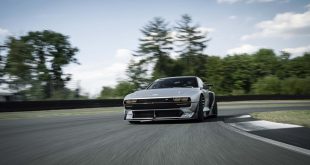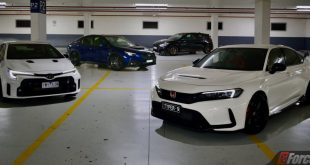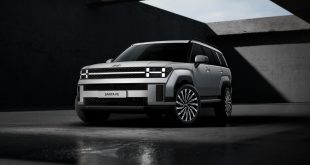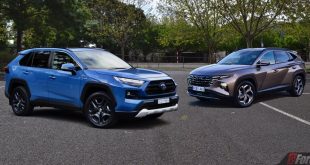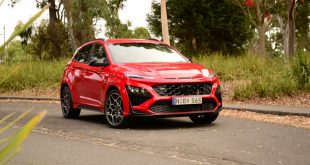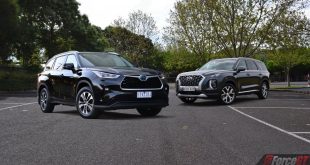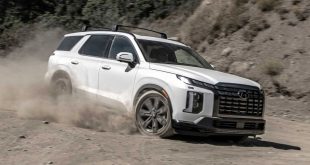If we removed the badges on this car, you would be hard pressed to pick it as a Korean offering. Looking distinctively premium, the Hyundai i40 sedan’s elegant lines symbolise the company’s coming of age, and its standing on the automotive world stage.
And while we are on the subject of car badges, badge snobs should stop reading right now as you may not like what I have to say about this car. And no, I am not on Hyundai’s payroll either.
Hyundai and its sister brand, Kia, are ambitious companies, with plans to challenge larger car makers like Toyota and Volkswagen, which when combined, has 150 years of automotive pedigree. The company’s growth over the last few years has been nothing but impressive. Today, it commands no less than 5.2 percent of the global market and is the fifth biggest automaker in the world. What’s more extraordinary is the quality that comes with each successive generation of vehicles.
The i40 sedan reviewed here is the mid-spec Elite Diesel. The range starts with the Active, which can be had in either Petrol or Diesel, and mated with a 6-speed manual or automatic. The Elite and Premium models are offered exclusively as automatics and is available as a Petrol or Diesel.
Design & comfort
The Hyundai i40 sedan joins the i40 Tourer and i45 sedan (Sonata in some markets) in the company’s comprehensive mid-size Australian line-up. While the i45 was designed predominantly for the North American market, the i40 was penned in Hyundai’s Russelsheim studio in Germany, under the guidance of Chief Designer, Thomas Bürkle, for the European market.
It comes as no surprise then that the i40 looks as good as, if not better than, other European cars like the Volkswagen Passat or Ford Mondeo. The car’s swooping roof takes inspiration from the current crop of ‘four-door coupés’ such as the Mercedes-Benz CLS and Volkswagen CC.
The only distractions to the car’s overall crisp design are its overly fuzzy headlamps design.
The i40’s elegant exterior styling is matched inside with high quality plastics and classy switchgears. There is ample storage in the cabin for its five occupants, whom no doubt will find the acres of space inviting.
On the move, it is refined and amazingly quiet; even with the diesel engine nestle at the front. The seats are supremely comfortable and provide an excellent driving position.
If there is any gripe about the interior quality, it has to be the flappy paddles that are both cheap to the feel and in operation.
Score: 8/10
Handling and performance
Although the i40 shares its platform with the i45, its chassis set up is tuned markedly different to the i45 to suit European driving style. The ride is a tad firmer and sportier, thanks to stiffer springs.
Hyundai Australia also undertook extensive local tuning on the car to produce a specific suspension and steering systems calibration unique to Australia.
The car feels solid and composed and displays the sure footedness usually associated with sportier models. Carry too much speed into a corner, the car will produce some predictable understeer. When sauntering through the city, the car will soak up undulation with aplomb, while out on the freeway, the i40 will happily devour long distances so characteristic of our vast continent, in sheer comfort.
The test car’s six-speed automatic gearbox pairs perfectly with the punchy diesel, and is the gearbox of choice. It’s smooth shifting and kicks down willingly when commanded. There is hardly any turbo lag from the engine and it pulls strongly from around 2,000rpm.
There is also a ‘Sport’ button on the centre console that alters the car’s steering assistance and throttle mapping to yield a …er, sportier feel. Not sure if I would be bothered though.
The biggest issue though, is with the steering. It is vague and light at straight-aheads and artificially weighted when turned.
Score: 8/10
Quality
The i40 feels like a car that is thousands of dollars more expensive than what it demands. Fit and finish is top rate and it scores a 5-Star ANCAP crash worthiness rating. Every Hyundai sold is Australia also comes with a 5-year manufacturer warranty.
Score: 8/10
Economy
During our week long test which consists of mostly urban driving and 20 percent freeway cruising, the i40 Elite Diesel returned a commendable 8.1L/100km. Equipped with a 70 litre fuel tank, that figure could theoretically enable the i40 Diesel to travel 864km before needing a pit stop.
All new Hyundais also benefit from the company’s iCare Cap Price Service, which sees the i40 Diesel costing just $329 per service or $987 over three years. Those opting for the petrol engine will see this dropped to $259 per service or $777 over three years.
Score: 8/10
Features
Standard equipment in the Hyundai i40 is extensive, even on the entry level Active model. Some of the creature comforts and safety equipment on the car will put many premium vehicles costing twice as much to shame.
On top of must haves like Bluetooth, USB connection, climate control air con and keyless entry and start, every model comes with 9 airbags – fronts, sides, rear sides, curtains and knee, Vehicle Stability Management (VSM) with Electronic Stability Control (ESC) and Traction Control System (TCS).
All i40s are equipped with an electronic park brake with handy Auto Hold feature. The latter will automatically apply the brakes when the car comes to a complete stop. It will then disengage when the accelerator pedal is pressed.
The i40 Active misses out on Satellite Navigation with live traffic report and an impressive premium sound system.
Score: 9/10
Verdict
The i40 is an excellent all-round package. It comes loaded to the hilt and performs exceptionally on the road. Anyone who brushed the Hyundai i40 aside based on its badge do so at their own loss.
| Price (Excl. On-roads): | From $29,990 – $44,590 $40,185 (As tested, including metallic paint) | |||||
| Warranty: | 5 years/unlimited kilometres | |||||
| Engine: | 2.0-litre, 4-cylinder, Direct Injection Petrol, 130kW@6,500rpm/213Nm@4,700rpm | |||||
| 1.7-litre, 4-cylinder, Common Rail Direct Injection Diesel, 100kW@4,000rpm/(MT) 330Nm@2,000-2,500rpm/(AT) 320Nm@2,000-2,500rpm | ||||||
| Transmission: | 6-speed manual/6-speed automatic (as tested) | |||||
| Fuel consumption (manufacturer’s):L/100km | Petrol | Diesel | ||||
| Active Manual | Active Auto | Elite/Premium Auto | Active Manual | Active Auto | Elite/Premium Auto | |
| Combined | 6.8 | 7.5 | 7.7 | 4.7 | 5.6 | 6 |
| Urban | 9 | 10.4 | 10.5 | 5.5 | 7.2 | 7.6 |
| Extra | 5.6 | 5.9 | 6.1 | 4.3 | 4.8 | 5.1 |
| Body: | 4-door sedan | |||||
| Safety: | 5-star ANCAP | |||||
| Dimensions: | Length: 4770mm, Width: 1815mm, Height: 1470mm, Wheelbase: 2770mm | |||||
| Kerb Weight (kg): | Petrol | Diesel | ||||
| Auto | 1514 – 1659 | 1441 – 1595 | ||||
| Manual | 1495 – 1648 | 1420 – 1574 | ||||
Car reviewed is based on Australian Specified model and may differ to that available in your country of residence.
 ForceGT.com Car News, Car Reviews, Video Reviews, Tuning and much more.
ForceGT.com Car News, Car Reviews, Video Reviews, Tuning and much more. 